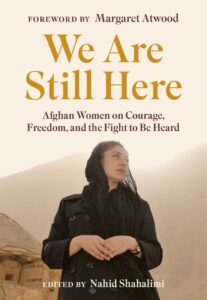
In Conversation with Nahid Shahalimi
Nahid Shahalimi discusses her new book, “We are still here – Afghan Women on Courage, Freedom, and the Fight to be heard”, the future of Afghanistan, and personal views on current issues.

Since the fall of Kabul to the Taliban on August 15, 2022, the situation for women in Afghanistan has been getting worse every day. Women are not allowed to leave the house without a male chaperone nor are they allowed to go to school after grade 6: Afghanistan is the only country in the world that prohibits young women from attending high school. The Taliban continue to restrict basic human rights for women with new decrees; just recently they banned women in Afghanistan from using gyms and public parks. The Taliban crush any protests against the systematic suppression of women – with force.
The fall of Kabul is considered to be linked to the international community’s unsuccessful attempt to support the country over the last twenty years. Canada’s involvement in Afghanistan lasted from 2001 to 2014; Germany was involved until 2021. Many of us remember the images of desperate Afghans trying to cling to the planes taking off from the airport in Kabul. In September of this year, the Enquete Commission “Lessons from Afghanistan: The Future of German International Engagement” was established in the presence of Bundestag President Bärbel Bas (Social Democratic Party). Michael Müller (Social Democratic Party), the former governing mayor of Berlin, was elected chairperson. Serap Güler (Christian Democratic Party) is the deputy chairwoman. The committee’s goal is to evaluate the German contribution to the international stabilization mission in Afghanistan between 2001 and 2021 and make recommendations for future missions to regions in crisis. Germany was involved in Afghanistan for more than 20 years and, according to Michael Müller, the German military mission and the billions of euros invested in humanitarian aid as well as investments in civil society have not led to lasting peace.
I had the pleasure to speak with Nahid Shahalimi about ongoing issues in Afghanistan. Nahid is a Canadian author who was born in Kabul; she currently lives in Germany with her two daughters. Nahid studied Fine Arts and Politics & Southeast Asian Studies with a specialization in Human Rights. She is an author, social entrepreneur, and international consultant on gender, a former professional athlete, a filmmaker, and an artist. She is also a philanthropist and founder of the campaign “Stand Up For Unity” which promotes unity through diversity. Nahid Shahalimi is an active member of UNICEF Germany’s National Committee and she is the founder and chairwoman of the “Hope Foundation for Women and Children in Afghanistan”, which has been active since 2007. She has supported women’s and girls’ initiatives in Afghanistan for the last two decades. Her work gained momentum after she began working in the field, interviewing, filming, and financing small grass-root projects in Afghanistan. Stretching from educational, creative, and empowerment projects to supporting the women’s national sports teams with equipment – all having female empowerment at its core – one of her current projects is a scholarship program for midwifery in rural Afghanistan in collaboration with a local education facility that has been running since September 2021.
In the interview, Nahid and I are talking about her new book “We Are Still Here – Afghan Women on Courage, Freedom, and the Fight to Be Heard”, which was published in Canada in August 2022, one year after the fall of Kabul. In her book, Shahalimi gives Afghan women experts a platform to speak about their experiences and their ideas for the future of their country. Additionally, she shares her own thoughts about women in Afghanistan, the role of Germany, parenting her daughters, and her personal sources of strength.

We have to remind ourselves how we are all connected more than we are separated. - Nahid Shahalimi
The interview was conducted on October 25, 2022. The opinions expressed in this article and in the interview are those of the author.
Nahid Shahalimi, foreword by Margaret Atwood, Penguin Random House Canada: “We are still here – Afghan Women on Courage, Freedom, and the Fight to be heard”, ISBN: 9780735246003